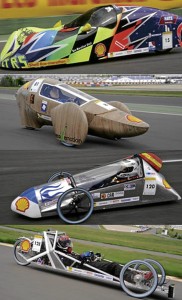
THE DESIGNS for the now world-famous Shell Eco-Marathon competition represent what can be achieved with current technology and offer a glimpse into the future of car design based on minimal environmental impact in a world with reduced oil reserves.
There’s a reason why these lightweight and flimsy-looking wheeled contraptions try to veer away from the usual look of present-day vehicles or why they employ a broad mix of energy sources—gasoline, diesel, liquefied petroleum gas, batteries, solar and even hydrogen.
The technology involved ranges from the most simple to the cutting-edge. But the most interesting aspect about this endeavor is that only college and high school students are allowed to participate.
According to Shell NGO and Stakeholder Relations manager Ronald Suarez, the Shell Eco-Marathon is a competition in which participating vehicles take fuel consumption to the extreme.
“In order to optimize fuel consumption, each participating team explore different design aspects such as aerodynamics, rolling resistance, engine efficiency and driving techniques in order to make the leap required to improve driving performance,” he said during the public run of the Shell Eco-Marathon at the Philippine Society of Mechanical Engineers, held at the SMX Parking Area in Pasay City.
The Shell Eco-Marathon stretches back over 50 years, in 1959, when a group of Shell scientists had a friendly bet to see who could drive the farthest on their own car with one gallon of fuel. Although they didn’t achieve much more than 50 miles per gallon, their efforts laid the foundation of today’s prestigious international event that is being held annually in America, Asia and Europe.
This year, Pilipinas Shell Petroleum Corp. announced its partnership with the Philippine Society of Mechanical Engineers to further push its advocacy for sustainable and smarter mobility solutions for the future.
Founded in 1952, the PSME is the largest and only accredited professional organization of mechanical engineers in the country.
Suarez explained that Pilipinas Shell would like to show the PSME, its partners and guests the importance of applying technology and innovation in unlocking the energy challenges we face in the future, adding that the Shell Eco-Marathon is an excellent platform for students to showcase their application of technology and innovation, as well as their passion and creativity, in the space of mobility.
He added Shell Eco-Marathon recognizes the fact that the growing global population and rising prosperity is now putting an increasing pressure on mobility or the movement of goods and people.
The number of cars is expected to triple worldwide by 2050, and aviation and shipping are growing strongly.
“But at the same time, concerns about our environment are increasing and for our part, Shell is constantly finding innovative ways to move more people and goods, safely, cost-effectively and with reduced impact on the environment,” Suarez said.
He added that the Shell Eco-Marathon is a great opportunity for young Filipino students to elevate their learning and talents through this event.
“What is more challenging is that our young Filipino engineers will be competing against their contemporaries from other Asian countries. It is a special opportunity that should not be missed by our young engineers,” Suarez said.
Last year’s winner in the Asian region was Thailand’s Luk Jao Mae Khlong Prapa team of the Dhurakij Pundit University, which broke its own 2010 track record for achieving 2,903 kilometers in its Prototype Ethanol car.
The event was held—for the past three years—at the 85-kilometer Sepang International Circuit in Malaysia.
Teams from the Philippines, while failing to place on the podium, were able to showcase their knowledge and skills. The De La Salle University Eco-Marathon Team Proto won the “Technical Innovation Award” for its innovative battery management system and smart cruise control function to electronically ensure the best energy efficiency possible while the TIP Mileage won the “Best in Team Spirit Award” with its collaborative spirit, positive dynamics, and highly energized attitudes.
The most fuel-efficient car in the Philippines achieved 164 kilometers per liter diesel consumption.
Shell Eco-Marathon Asia will be hosted again by Malaysia this year, after which the regional event will take place in Manila from 2014 to 2016.